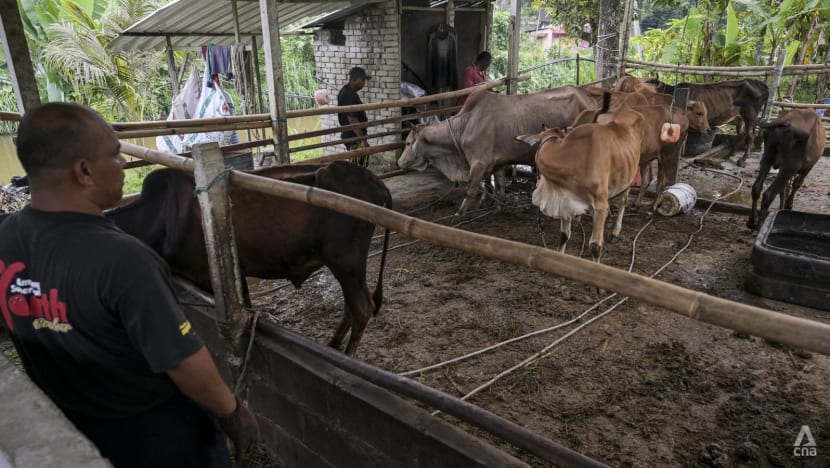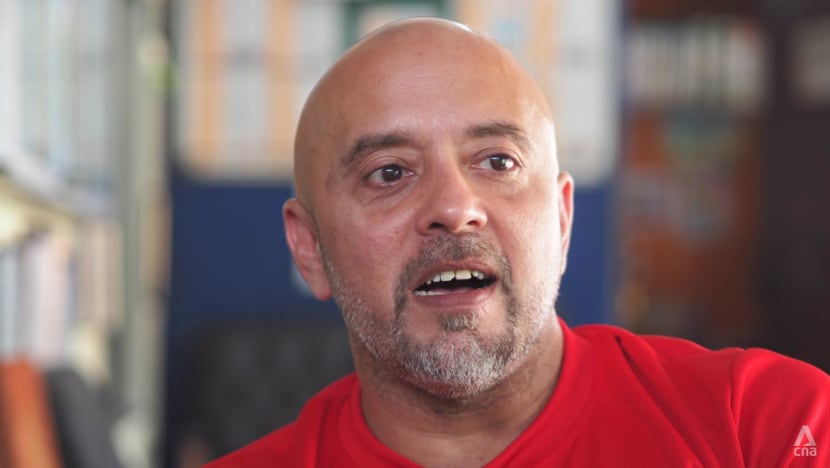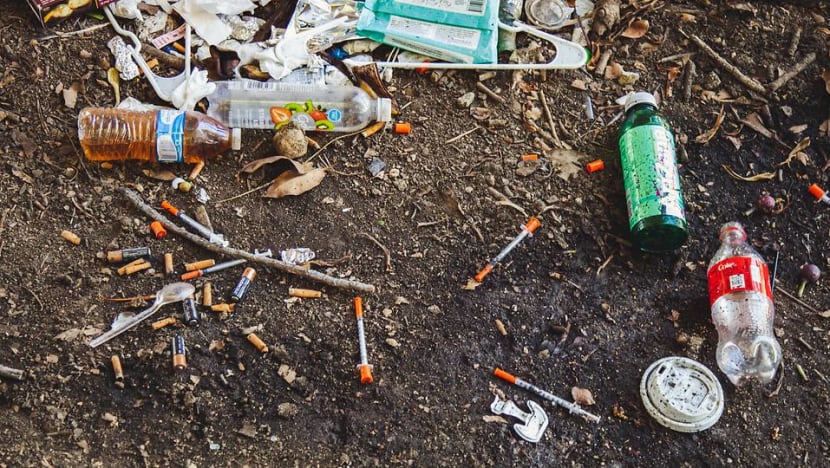With Malaysia’s drug abuse cases at ‘critical level’ amid rise of Kpods, can it turn the tide?
Experts are calling for a shift from a punitive approach against drug users to one focused on public health and rehabilitation.

Marching is part of the morning routine for residents at the Rumah Sahabat drug rehabilitation centre in Hulu Langat, Selangor. (Photo: CNA/Fadza Ishak)

This audio is generated by an AI tool.
KUALA LUMPUR: When 17-year-old Aiman (not his real name) was offered a puff of his schoolmate’s electronic vaporiser for the first time several years ago in school, he did not think twice about it.
To him, the offer was casual and seemingly harmless. He took one puff of the vape and was hooked almost immediately. What he did not know then was that the device was laced with a potent substance believed to be “magic mushrooms” that made him addicted to vaping.
Known by their scientific name psilocybe cubensis, the use of the hallucinogenic fungi in vapes has gained popularity.
Aiman’s addiction grew, his grades plummeted, and his relationship with his parents soured.
With heavy hearts, Aiman’s parents made the difficult decision to place him at the Rumah Sahabat drug rehabilitation centre in April this year, desperately hoping for a new beginning for their son.
Tucked away next to a serene river in Hulu Langat in Selangor state, Rumah Sahabat offers a unique form of rehabilitation centered on spiritual and religious guidance within a community setting.
The privately-run facility receives the support of the Selangor State Islamic Religious Council and is registered with Malaysia’s National Anti-Drugs Agency (AADK). The AADK had said in the past that drug users who volunteer for rehabilitation will not be registered as offenders.
In Rumah Sahabat, residents like Aiman undergo a structured programme designed to help them rebuild their lives and kick their drug addiction to the curb.
They have the chance to be involved in small-scale farming activities to fill their time such as growing vegetables and looking after cattles, among other things.

“I hope to go home soon, but I am not sure when my dad will take me back,” Aiman told CNA on a recent weekday afternoon upon returning to Rumah Sahabat from school. He has switched to a new school since living at the centre for the past four months.
The soft-spoken teenager's struggle is not an isolated incident but a microcosm of a much larger, escalating crisis in Malaysia, with Deputy Prime Minister Ahmad Zahid Hamidi having declared in May that drug abuse in the country is at a "critical level" that threatens public safety.
Statistics cited by Ahmad Zahid showed a 32.5 percent increase in the number of reported drug users and addicts in Malaysia from 2023 to 2024.
On Sunday (Aug 10), he said that Malaysia needs to change its strategy to tackle the scourge of drug abuse, as the situation was very worrying with an increase in the use of synthetic drugs and new distribution methods through social media platforms, for instance.
Experts told CNA that the introduction of new types of drugs, such as those used in vapes, was concerning, as this represents a new method for syndicates to distribute substances to a younger demographic of potential addicts.
Malaysian Substance Abuse Council (MASAC) secretary-general Raja Azizan Suhaimi, for one, told CNA that many of the substances in vapes are yet to be gazetted as drugs by the authorities.
MASAC is a non-governmental organisation that advocates for a shift in perspective on drug abuse, viewing it as a mental illness rather than a crime.
“This is a worrying trend. The vape might make people less dependent on cigarettes, but what about the substances contained in the liquid, especially those sold by those operating underground. As long as the substances are not officially gazetted, they won't be detected by test strips," he said, without specifying what the substances are.
Singapore is moving to list an anaesthetic agent called etomidate as an illegal drug after seizing vapes found to contain it, and with drug-laced vapes known as “Kpods” gaining ground among the young.
In Malaysia, Bandar Kuching member of parliament Kelvin Yii recently proposed in parliament to list etomidate as a dangerous drug, following reports of deaths caused by the drug in Singapore.
But Health Minister Dzulkefly Ahmad on Jul 30 said that a thorough study will be conducted before any decision is made to list etomidate as a dangerous drug under Malaysia’s law.
‘PAINFUL PUBLIC HEALTH AND SECURITY CHALLENGES’
Despite a war declared on drugs as early as the 1980s, the scourge has neither diminished nor been contained, said criminologist P. Sundramoorthy of Universiti Sains Malaysia.
“Malaysia's decades-long battle against drugs remains one of its most protracted and painful public health and security challenges. It is a national security and safety issue because users endanger others,” he said.
Sundramoorthy pointed out that the country’s prisons remain overcrowded, with a significant number being repeat drug offenders. Authorities have said that about 60 per cent of prisoners in jail are due to drug-related offences.

According to statistics from AADK, Malaysia recorded 192,857 drug users and addicts in 2024, a 32.5 per cent increase from the 145,526 cases the year before.
Statistics also show that 61 per cent of these individuals are aged between 15 and 39. This is slightly down from the 63.2 per cent in 2023.
Rumah Sahabat lead coordinator Mohamed Shamseer Sarwar told CNA that requests for drug rehabilitation services at the centre have been relentless. Currently, Rumah Sahabat has hit full capacity, with 150 residents living there seeking treatment for their addiction.
“Everyday we have people asking us to take their loved ones in. Drugs are still a serious issue,” said Shamseer, who has been based at the centre since 2017.
While “traditional drugs” such as heroin and cannabis remain in circulation, synthetic narcotics like methamphetamine and designer drugs have taken centre stage.
Shamseer - a former drug user now turned counsellor - observed that for every 10 people who are enrolled in Rumah Sahabat, at least eight were addicted to synthetic drugs.
“Many come here with mental (health issues) caused by the use of the drugs,” he said.
According to statistics released by the AADK, the most used drugs last year were amphetamine-type stimulants which were involved in over 70 per cent of drug use cases. This is then followed by opiates like morphine and heroin (about 23 per cent), and marijuana (4 per cent).
Sundramoorthy said that drug use in Malaysia cuts across age groups, with worrying signs of rising experimentation among youths and even schoolchildren.
“Urban poverty, fractured family structures, joblessness, and mental health issues all serve as fertile ground for addiction,” he said.
INTENSIFIED SUPPLY OF DRUGS
Sundramoorthy also pointed out that Malaysia is “perilously” close to the Golden Triangle, known as one of the world’s most prolific drug-producing regions.
The Golden Triangle is a mountainous area where the borders of Myanmar, Thailand and Laos converge.
He said that trafficking syndicates use Malaysian ports and borders as transit points, often aided by porous enforcement and, in some cases, corruption.
A report by the United Nations Office on Drugs and Crime (UNODC) that was released in May 2025 found that the illicit manufacture and trafficking of synthetic drugs from the Golden Triangle has grown exponentially.
The report - titled Synthetic Drugs in East and Southeast Asia: Latest Developments and Challenges - said that the “explosive” growth has led to a record amount of methamphetamine seizures in East and Southeast Asia in 2024 totaling 236 tonnes, marking a 24 per cent increase compared to 2023.
It pointed out that Malaysia reported a six-fold increase in the seizure of drugs in 2024 compared to the previous year, amounting to 16.8 million tablets.
This marked the first time in history that Malaysia seized more than 10 million tablets in a single year, said the report.
“These developments may indicate an intensified supply of methamphetamine tablets beyond the Mekong region to archipelagic Southeast Asian countries, including Malaysia, which is increasingly being used as a transshipment point,” the report said, adding that Malaysian authorities estimated that 20 per cent of total drug seizures was for the local market.
Experts pointed out that it does not help that drugs are readily available at a call away for those who want it.
Raja Azizan of MASAC, for one, questioned how large quantities of drugs continue to flow into Malaysia.
“Weapons, sex, and drugs are a billion-dollar business. And this would mean that there are ‘big’ people who are involved. If not, how can it be so widespread and rampant? The problem will never go away because the demand is there. And so is the supply,” he said.
Most recently, local media reported on Aug 13 that the Malaysian Anti-Corruption Commission (MACC) has busted a smuggling syndicate allegedly operated by senior Malaysian armed forces officers.
Free Malaysia Today reported that the senior officers - who were from the armed force’s intelligence division - were suspected to have leaked military operational information to smugglers and facilitated the entry of contraband such as drugs, cigarettes, and other banned goods from neighbouring countries worth about RM5 million (US$1.2 million) a month.
The AADK and the police did not respond to CNA’s queries about the drug situation in the country.
NEW METHODS NEEDED TO COMBAT DRUG SCOURGE
A 50-year-old woman from Raub, Pahang, told CNA that she wants to and has tried stopping her addiction to drugs such as methamphetamine and marijuana numerous times but has not succeeded until today.
She has been detained by the authorities several times, and has twice been sent to a government-run rehabilitation centre.
“Substance (abuse) is bad. It will affect your health and all that. But without it, I don't think that I can even function,” she said, adding that she lives in fear of getting caught by the authorities.
She hopes that people would view addicts as humans who need help and not punishment.
Meanwhile, experts say that the country’s drug policy has been one-dimensional and largely punitive, rooted in the belief that harsh laws and enforcement will deter both supply and demand.
Ahmad Zahid himself admitted recently that a new and non-conventional way was needed to combat drug abuse in the country.
"The government has spent over RM50 billion on prevention, enforcement, and treatment, but the effect is that drug abuse is still on the rise.
“We must admit this failure ... let's set aside our differences to ensure that even if the country cannot be 100 per cent free of drug abuse, it is not impossible for us to reduce it to the bare minimum," he was quoted as saying by Bernama on Aug 10.

Malaysia has harsh punishments for drug offences, including the death penalty for trafficking.
But Sundramoorthy said that for all the arrests and seizures, the flow of drugs has not abated, and relapse rates among addicts remain troublingly high.
He said one critical aspect that warranted investigation was whether any officials or law enforcement personnel may have been complicit in the operations of syndicates.
This, he said, would not only undermine the integrity of Malaysia’s anti-narcotics efforts but also reflected the challenges faced in eradicating systemic corruption within the country's law enforcement agencies.
Sundramoorthy added that while there should be zero tolerance for those trafficking and selling drugs, a new “out-of-the-box” approach was needed to deal with users.
He cited the example of Portugal which decriminalised all drugs in 2001.
“Countries like Portugal have seen dramatic improvements by decriminalising drug use and focusing instead on harm reduction, counselling, and reintegration.
"Malaysia must consider partial decriminalisation for small possession, especially for repeat users who need treatment more than prison,” he said, adding that prevention should also be emphasised in school.
Raja Azizan echoed Sundramoorthy’s views, advocating for a new approach of decriminalisation where individuals would have the chance to seek help without fear of legal consequences.
“Drug use is wrong, but treatment is the way to go, not imprisoning. The approach should be changed to one that is non-punitive, and users should be treated according to the severity of their substance use.
“We do not want those who are just experimenting to be immediately put in prison and have their futures ruined,” he said.
As for Aiman who is seeking treatment in Rumah Sahabat, he is still hoping for a path to redemption. The teenager said that he is glad that he has the chance to do so with a community that understands what he is going through.
“This is my second chance, and I hope to make it count.”
























